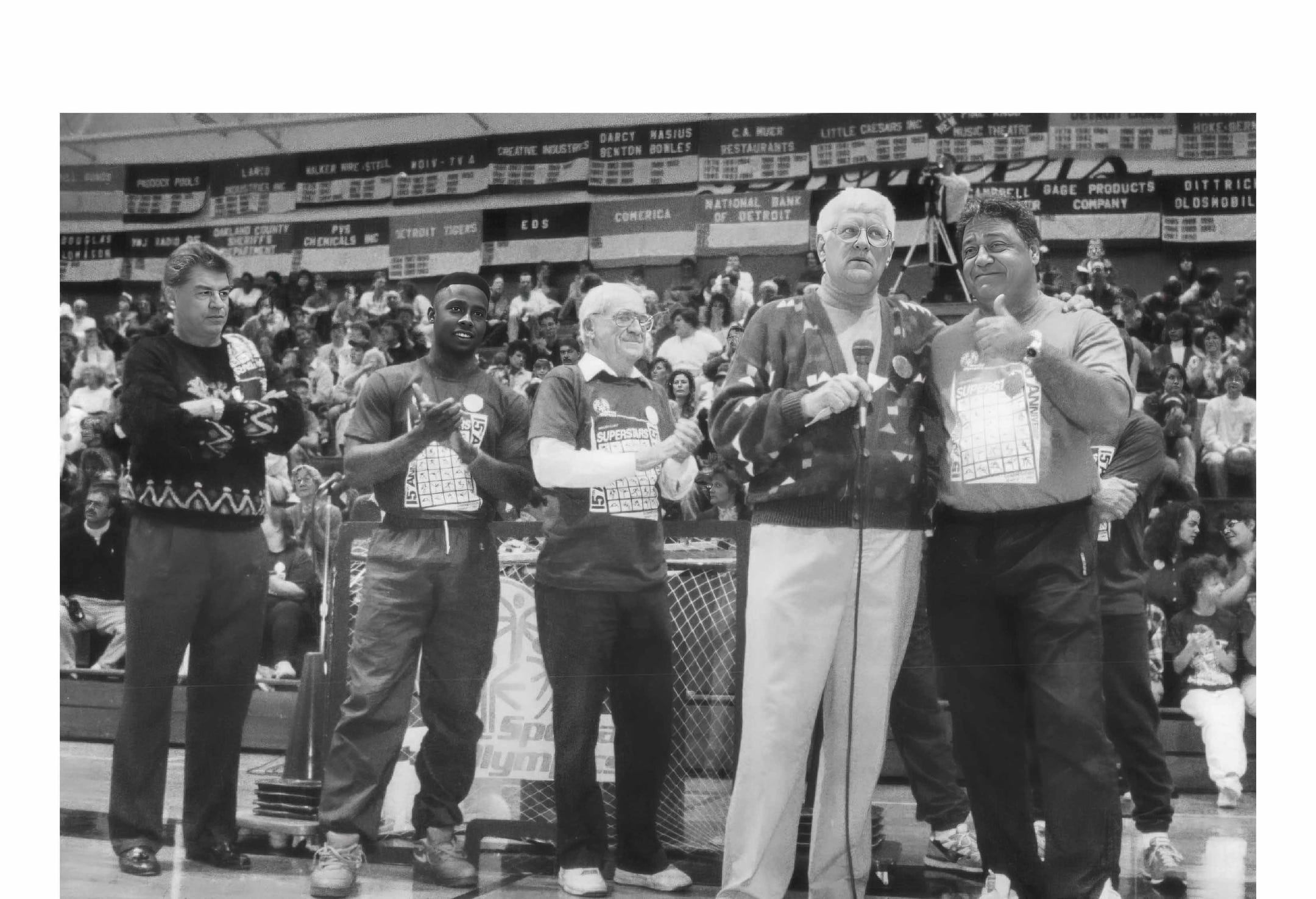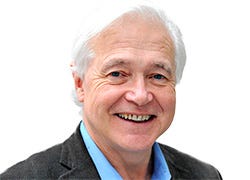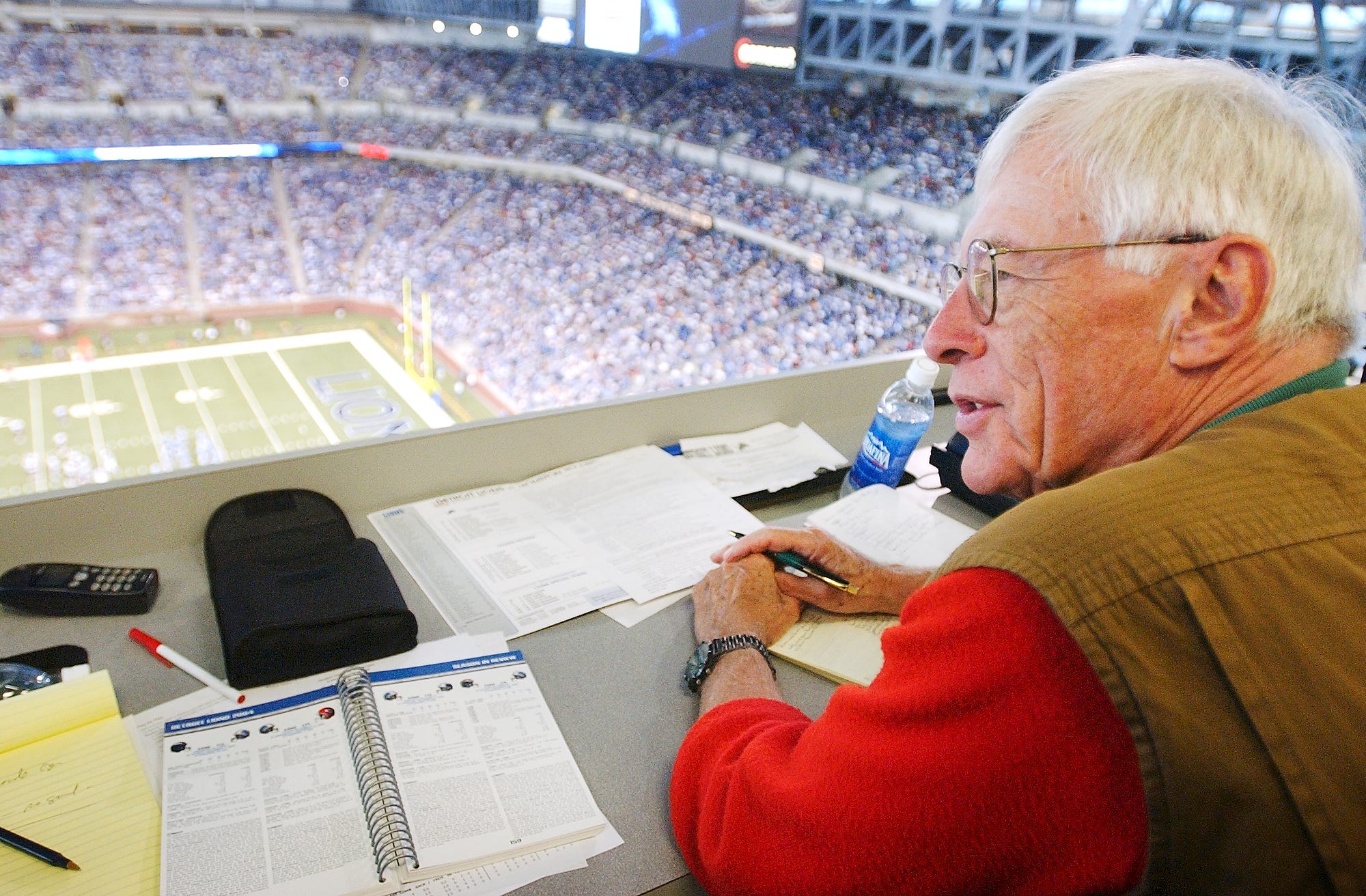
Several generations of Detroit sports celebrities: Pistons coach Chuck Daly, left, UM wide receiver Desmond Howard, Tigers announcer Ernie Harwell, News columnist Joe Falls and Lions coach Wayne Fontes. Detroit News archives
Several generations of Detroit sports celebrities: Pistons coach Chuck Daly, left, UM wide receiver Desmond Howard, Tigers announcer Ernie Harwell, News columnist Joe Falls and Lions coach Wayne Fontes. Detroit News archives
 Lynn Henning
Lynn Henning
In press boxes and clubhouses, in newsrooms as well as in locker rooms — and, yes, in sundry saloons — they etched their art and their lore and helped make an indelible imprint on a Detroit News audience spanning 150 years.
Sportswriters. Sports columnists.
And what a Detroit News gallery it has been.
H.G. Salsinger, Sam Greene, Doc Greene, Pete Waldmeir, Jerry Green, Joe Falls, Shelby Strother, Mike O’Hara, Tom Gage, Bill Halls, Jack Berry, Harvey Barcus, Watson Spoelstra, Vartan Kupelian, Dan Ewald, Bill Brennan, George Van, Al Coffman, Jim Spadafore, Ken Williams, Larry Middlemas, Beverly Eckman, Jim Eathorne, as well as countless copy editors and slot-bosses and all species of people who have, over generations, made the Detroit News sports staff a rich and colorful biosphere.
Columnists occupied the spotlight much of the time and were distinctively unique in their styles, thoughts, and prose.
Consider the group’s veritable patriarch, Salsinger, who for 49 years was Detroit News sports editor and who died in 1958 at age 73.
Note the straight-line grace and formality within this opening paragraph from a News story on Nov. 2, 1924.
“In any all-time rating of players, Tyrus Raymond Cobb stands alone,” Salsinger wrote. “He was the greatest of the greats, a fiery genius and the game’s outstanding individualist. Brilliant and unorthodox, he made baseball history for more than two decades. He dominated the game.”

Nothing flashy there. Simply clear, declarative, informed prose that marked Salsinger’s more corseted era of sports writing.
Times changed. So did sports reporting, commentary and the characters who authored an increasingly flamboyant newspaper presentation.
Doc Greene personified the ways in which literature and sports’ array of colors and personas could meld, wondrously.
Greene was the son of four-decades Detroit News icon, Sam Greene, the impeccably mannered Virginia gentleman who moved to Detroit in the early ‘20s and covered the Tigers, principally.
His son was, well, a chip from the block — a jagged chip, perhaps.
A terrific writer who cut like a scimitar through the fog of a sports story, Doc Greene was a marvelously skilled drinker and raconteur whose travels and acquaintances (Ernest Hemingway included) were as spellbinding as the expensive silk suits and polished shoes he favored.
The bar tales surrounding Greene, including columns written either from the Lindell AC, or from the original Anchor Bar, are indeed legend.
So, too, were moments uniquely, exclusively, Doc Greene.
He was covering the Preakness thoroughbred race at Pimlico in 1962 and had just finished writing when a helicopter touched down on the infield, bound for Greene’s commercial flight back to Detroit in time to make weatherman-legend Sonny Eliot’s wedding that night.
Greene’s health deteriorated, and in June 1970, he was fired from The News for getting involved in a Joe Frazier-Muhammad Ali fight promotion in Detroit. He died two months later, at 50, of a heart attack.
A final flourish: At his funeral, there were no tributes, no eulogies. A Dixieland band paraded in, played a funeral dirge, and departed. Service over.

Waldmeir had worked since 1962 as a columnist alongside Greene and, following Greene’s departure, was The News’ uncontested heavyweight champion in sports reporting and opinionating. Waldmeir was savvy across the spectrum of Detroit’s pro sports, as well as in knowing the depths, intricacies, and players within the University of Michigan and Michigan State.
It was Waldmeir who scored during the postgame press session at the 1970 Rose Bowl after Bo Schembechler had gone missing from that day’s game against Southern Cal.
Doctors and officials hemmed and hawed until Waldmeir asked: “Did Bo have a heart attack?”
In fact, he had and was in the hospital. It was Waldmeir, not surprisingly, cutting through the smoke and barbed wire to get a straight answer on a day of near-tragedy for Michigan’s then-40-year-old head football coach.
Waldmeir switched in 1972 to a more challenging, perhaps more incendiary, path as a general columnist, with sights aimed at City Hall and, in particular, then-mayor Coleman Young.
His eventual replacement on The News’ sports pages: Jerry Green, a one-time Associated Press sports bureau chief in Detroit who had joined The News as Lions beat man. In 1973, the Ivy League grad (Brown University, and proud of it) and East Coast sophisticate was ripe for the column he was aching to write.
Green had been a superb football writer during his earlier days and had a natural comfort with the Lions and NFL. It showed not only with a massive national scoop — in January 1978 — that Monte Clark was headed to Detroit as Lions coach and chief of operations, but in his Super Bowl kinship: Green was the only writer to have covered each of the first 56 Super Bowls, a string broken during the past year, only a month before he died.

It was Green, largely, in the News’ sports-column cockpit, with Mike O’Hara penning a Saturday column (Cyndi Meagher and Alex Ben Block had brief stints), until October of 1978 when Detroit sports-writing had its own news bulletin: Joe Falls was leaving as Free Press sports columnist for a same-role spot at the News.
Falls had been feuding for six years with Free Press executive editor Kurt Luedtke and finally had endured enough (Luedtke was gone days afterward). Paired with Green, Falls gave The News a sports-page tandem it promoted and exploited in stoking a perpetual competitive fire with the Free Press.
Strother came aboard in 1985 and brought a style, both fixating and idiosyncratic. His writing was as authentic as Strother, a Florida native and Satellite Beach denizen whose Air Force father had been friends with Apollo astronauts such as Gus Grissom.
Strother died in 1991, of cancer, at 44.
A modern-day team arrived afterward, with Bob Wojnowski as columnist and quarterback.
The games go on. So do the chronicling and the commentary. And to the degree to which personalities and talents coalesce on a sports page, the writers and writing continue, also, 150 years after The News rose amid a decidedly different sports landscape.

Lynn Henning is a freelance writer and retired Detroit News sports reporter.